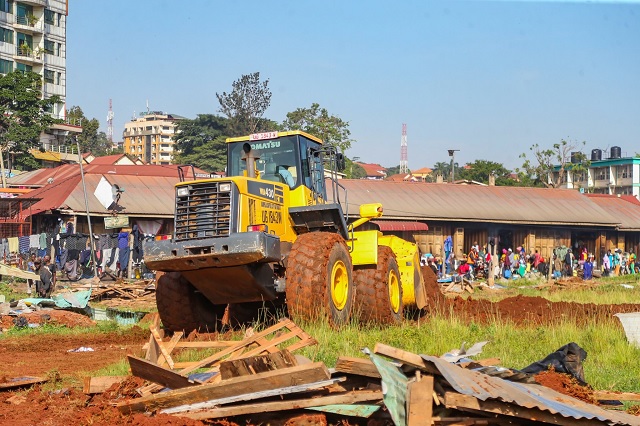
Kampala, Uganda | THE INDEPENDENT | Kampala Capital City Authority-KCCA has started the repossession of Kiseka market land amidst protests from vendors who leased it 11 years ago.
Around 7:30am on Tuesday, a joint security team comprising heavily armed police and UPDF backed by plain-clothed men carrying sticks stormed Kiseka market with bulldozers to level part of the land, which was awaiting construction.
Kiseka market covers up to 3.8 acres of land along Kiseka lane, Mp’abana area. Of these, 1.2 acres host storied buildings as part of the terms of their leasehold, which the vendors obtained from KCCA. In 2011, a group of vendors under the Kiseka Market Vendors Development Association obtained a 49-year lease on this land with promises of redeveloping it to suit the city standard.
However, only 1.2 acres of the 3.8 acres have been developed, according to the market leaders, who say they have invested over Shillings 40 billion in this project.
“It is a pity that government doesn’t follow the law. It’s like this country belongs to a certain clique that decides what happens irrespective of the law. We agreed with the government to develop this place, and paid Shillings 1 billion for the leasehold in addition to that, we have invested more than 40 billion Shillings in the construction and other processes. And all this money was mobilized from the vendors, and now without any compensation, they are grabbing the land,” said Simon Peter Lubwama, the Kiseka market spokesperson.
There was a bitter exchange between some of the vendors and the KCCA enforcement officers, which called for police involvement.
Simon Kashyate, the KCCA spokesperson says that the authority is implementing a presidential directive in his October 23, 2022 letter to the Kampala minister to take over the contested land. He explains that they started with the open space as they work out means of taking over the developed side as well.
According to Kashyate, the president wants the Authority to take over the management of Kiseka market. “The president says that markets should be for low-income earners, and act as a business nursery, and this ever builds enough income leaves. So we are preparing for these people who will be paying a nominal fee to the authority as rent, and what they get enough capital they leave,” Kashyate said.
When asked who are the low-income earners, how are they classified, and what is determining the incubation period for one to leave the market, Kashyate said the gender department is yet to come up with guidelines. Some of the vendors interviewed by URN expressed dissatisfaction and betrayal by KCCA and the government and vowed not to allow anyone to operate from the land they paid for.
Richard Lubega, the chairperson of the Federation of Kampala Hawkers and Vendors Association, says he was called in the night to come and be part of an event and that is when he learned that although this place belongs to vendors in the market, it was being prepared for the evicted street vendors who reside in Kampala central division.
He welcomed the move to relocate the vendors, saying the government should have done this before evicting them from the streets. He, however, noted that there was no transparency in the way the government is implementing this exercise because many street vendors are unaware of the developments.
In 2009, president Museveni directed KCCA to offer leaseholds to vendors who were operating in government city markets. He, however, made a turnaround and instructed KCCA to repossess the land and the property thereon.
*****
URN
 The Independent Uganda: You get the Truth we Pay the Price
The Independent Uganda: You get the Truth we Pay the Price



